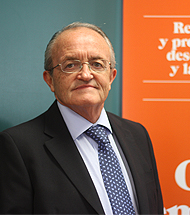2014_05_14_ICS_Si no existe empatía, la relación entre médico y paciente no puede funcionar como debería
"If there is no empathy, the doctor-patient relationship cannot function as it should."
José Antonio Gutiérrez, honorary advisor to the Fundación Lilly, spoke at the I meeting 'Academia y Sociedad', organized by the ICS.

José Antonio Gutiérrez, honorary director of the Lilly Foundation Lilly Foundation (Chair de Education Médica) pronounced the lecture 'training and skill emotional in the medical Education ' in the roundtable 'Emotional conflicts in the medical attendance ', organized by the Institute for Culture and Society (ICS). Also participating were Pilar León, professor of the School of Medicine and collaborator of the Institute; Carmen Hijós, administrative assistant general of the high school Official of Doctors of Navarraand Maria Isabel Saracíbar, Dean of the School of Nursing.
The activity was part of the I meeting 'Academia and Society'. This forum, which was open to all citizens, was organized by the project 'Emotional culture and identity' of the ICS and was supported by sponsorship of Zurich Insurance. It analyzed the construction of healthy emotional contexts both in the field educational and in the medical attendance and business.
How important is the proper management of emotions in the healthcare environment both in prevention and in patient care?
The doctor-patient relationship is the fundamental act of the attendance health care. It is a relationship between a person, the patient, who has a disease - and who therefore demands financial aid- and another person, the physician, who has the knowledge to offer him/her financial aid. We should aspire to a transfer of both the feelings of the patient who requires care and the feelings of intention, pleasure and even interest in helping on the part of the professional. Without such empathy, the relationship cannot function as it should. Therefore, managing emotions and being clearly aware that they are there is fundamental in the medical act.
What emotional conflicts do physicians face?
Physicians must believe in what they do and have a vocation to help others. This has to do with feeling the need to help the person who is suffering, who has a pathology or who needs help financial aid. If this does not exist in the background, it creates an emotional conflict for the professional because he/she is doing something he/she does not really like and also for the patient, whose demand for financial aid is not met.
How can the training of physicians be improved so that they know how to better manage their own emotions and those that arise in the relationship with patients?
It is essential that there be a spirit, a previous vocation. It can be improved through the Education and the training of physicians, but fundamentally through experience: that students experience situations hand in hand with their teachers and learn through them to relate better and understand what happens to patients. The emotional state varies according to the circumstances and this has repercussions on the internship of the attendance healthcare, as in any other profession. The satisfaction that attendance, the relationship with patients and teaching bring or should bring to a good doctor are great stimuli.
